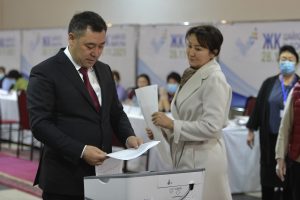Kyrgyzstan’s November 28 parliamentary election was plagued by low voter turnout and technical glitches at precisely the wrong time. Manual vote counting continues, but as it stands now, the day after the election, it appears that six parties, largely pro-government in outlook, will gain entry into the pared-down parliament.
Preliminary numbers as reported by the Kyrgyz Central Election Commission suggest that the Ata-Jurt Kyrgyzstan, Yntymak (Harmony), and Ishenim (Trust) parties will gain seats, with Alyans (Alliance), Yiman Nuru (Ray of Faith), and Butun (United) Kyrgyzstan parties also likely to enter parliament, as long as their vote shares in the final count pass the 5 percent national threshold to earn seats.
In their preliminary conclusions, the OSCE’s election monitoring mission stated, “The 28 November parliamentary elections were competitive but constitutional changes weakening parliament, subsequent extensive legislative changes to key aspects of the elections, a stifled campaign and overall voter disillusionment hindered meaningful engagement.”
Voter turnout for the parliamentary election — the third electoral exercise of 2021 for Kyrgyzstan — is estimated at around 34 percent, a record low. For comparison, last year’s October parliamentary election, the results of which were annulled after protests erupted the night after the vote, was 58.89 percent.
Kyrgyzstan’s elections, unlike those in the rest of Central Asia, are often competitive in a technical sense: 21 parties contested in the election and more than 300 people ran for seats via the new single-mandate districts.
This election took place under a new constitution (approved in April’s referendum) and under new rules (approved in August). The new constitution trimmed parliament from 120 deputies to 90, and the new electoral rules altered the way in which those seats were to be filled. Instead of the previous proportional party lists system, this election used a split system. Colleen Wood recently explained what voters would encounter at the ballot box:
Voters will receive two ballots – one with the names of the 21 parties running nationwide as well as 54 numbered squares (one for each person on the party list) where voters should choose a specific candidate. If the voter only selects a party, but does not mark a specific candidate, this ballot will be counted separately, which could make for confusion in calculating who will represent each party in parliament.
In addition, voters will receive a second ballot specific to their district with the names of candidates running to represent that constituency.
It’s perhaps not surprising that such an election system, so recently introduced, would stir up confusion and controversy. An election-day technical glitch only worsened the situation. According several reports, the CEC’s website began glitching after polls were closed. Its display of results, as Eurasianet and others observing the election reported, didn’t add up; then the site went down and when it rebooted parties that had seen themselves passing the 5 percent threshold had dropped below it. (See Eurasianet’s reporting from election day for more details). The CEC apologized for the glitch to parties rallying outside the commission’s offices in Bishkek.
The CEC reported that nearly 10 percent of ballots were spoiled. And in Bishkek, Eurasianet noted that in at least two single-mandate districts the “against all” option won, meaning those elections will need to be repeated.
Four opposition parties — Ata-Meken (Fatherland), Azattyk (Liberty), Social Democrats, and Uluttar Birimdigi (Unity of Ethnicities) — rallied in Bishkek the day after the election demanding that the results be annulled and new election called for. In polls conducted by the International Republican Institute (IRI) in September, Ata-Meken was the most familiar party nationwide amid a sea of new political parties. Ata-Meken’s leader, Omurbek Tekebaev, said votes had been stolen from his party by the glitch.
Kyrgyz President Sadyr Japarov posted on Facebook to “address the parties making a fuss” and said that no one would stop them from counting the ballots by hand. He added that if its found that the CEC “falsified” the results, those responsible would “pay with their heads.”

































